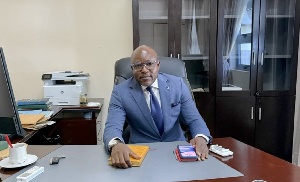- Home - News
- Elections 2024
- News Archive
- Crime & Punishment
- Politics
- Regional
- Editorial
- Health
- Ghanaians Abroad
- Tabloid
- Africa
- Religion
- Photo Archives
- Press Release
General News of Tuesday, 15 April 2025
Source: www.ghanawebbers.com
Constitution Review Committee receives over 500 proposals from stakeholders
The Constitution Review Committee (CRC) is reviewing Ghana’s 1992 Constitution. They have received over 500 submissions online and in person.
The committee consists of legal and governance experts. Their goal is to identify areas needing updates for Ghana's democracy and socio-economic needs.
They will examine past recommendations, suggest changes, and create a roadmap for amendments. Dr. Rainer Akumperigya, the CRC Secretary, shared this with the Ghana News Agency.
So far, stakeholder engagements have been productive. The committee has received submissions from various groups, including the National Commission for Civic Education and the Electoral Commission.
Non-Governmental Organizations (CSOs) like the Africa Centre for Energy Policy also contributed proposals. Professors from the University of Ghana have submitted ideas as well.
Notable figures like former Speaker Prof Mike Aaron Oquaye and former Chief Justice Sophia Akuffo represented the Institute of Economic Affairs in their submissions. Many engineers and institutions have also provided proposals.
Dr. Akumperigya mentioned that they met President John Dramani Mahama at Jubilee House for his insights. His experience as an assemblyman, MP, Vice President, and President was valuable.
The committee plans to meet with other government branches: Legislature and Judiciary. They will also engage former Presidents and Vice Presidents for their input.
After its inauguration in February, the committee set strategies for its work. They established timelines, planning methods, and resource allocation.
In their first week of discussions, they decided on two engagement types: stakeholder meetings and validation sessions.
Before forming the committee, President Mahama announced a National Constitutional Validation Conference. To avoid duplication of efforts, they merged this conference with their zonal engagements.
Eight zones were created from 16 regions: Tamale/Bolga; Wa; Sunyani; Kumasi; Takoradi; Cape Coast; Koforidua; with Accra as the hub for stakeholder engagements.
These zonal meetings are open to various groups: traditional authorities, educational heads, student unions, women’s groups, and disability organizations.
Mr. Akumperigya stated that they divided the Constitution into ten thematic areas. These include Lands Governance, Decentralization, Local Government & Chieftaincy, Public Services & Enterprises.
Other topics include independent constitutional bodies like the Electoral Commission and National Media Commission. Discussions will also cover government branches: Executive, Legislature, Judiciary.
Additional topics include Finance issues like discretionary power use and dual citizenship amendments.
Dr. Akumperigya explained how to amend entrenched versus non-entrenched clauses in the Constitution. Non-entrenched clauses can be amended by Parliament easily due to NDC's majority there.
For entrenched clauses, part of their mandate is to provide timelines and a plan for implementing recommendations.
He noted that their report would build on previous ones like Prof Albert K. Fiadjoe's review while considering current developments.











